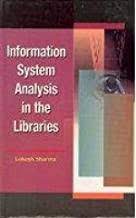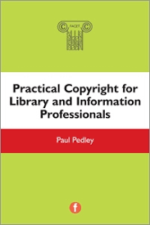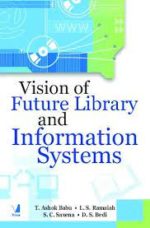Library classification forms part of the field of library and information science. It is a form of bibliographic classification. It goes hand in hand with library cataloging under the rubric of cataloging and classification, sometimes grouped to gather as technical services. Classification systems in libraries generally play two roles.
Library Classification
KSh 6,290.00
Library classification forms part of the field of library and information science. It is a form of bibliographic classification. It goes hand in hand with library cataloging under the rubric of cataloging and classification, sometimes grouped to gather as technical services. Classification systems in libraries generally play two roles.
1 in stock
Related products
-
Information System Analysis in The Libraries
KSh 6,630.00The present book ‘Information systems analysis in the Libraries’ defines “Systems Study” in the libraries, its planning and organization starting with various steps like analyzing procedures, surveying and looking into its methods and results in a scientific way. Designing and redesigning a system for betterment looking into sub-systems like acquisition, circulation, serial control etc. to function effectively in a modernized way. In brief, the book gives a comprehensive account of system-approach in the field of librarianship. The book is intended to be used widely as a textbook in the area of systems study for the students of library and information science.
-
Theories and Practices of Librarianship
KSh 2,550.00Librarianship, in the face of being derivative from a separate field of intellectual activity, cannot be observed only as form of secure on support discipline. A lot of would argument this explanation. It is additional frequent to effort to differentiate ‘core’ basics of knowledge and ability as characteristic of an exacting kind of professionality and to categorize additional features of working knowledge as non-professionals. Different theories and practices of librarianship are firmly discussed in this book.
-
Abstracting Practices In Libraries
KSh 1,000.00Abstracting services are important links in the chain of communication between the originator of information and the ultimate user. Enormous growth in published literature, diversity of publications, language barrier and scatter of published information etc., are some of the factors that have contributed the launching of abstracting and indexing services. Abstracting services are most important and useful tools. These bring together all or significant current publications, that lie scattered in a number of source documents. Indexing and abstracting services are also excellent records in contemporary published literature, the growth and development of which has been in direct response to get access to as much relevant information as possible on a subject. This book is a dependable reference work which imparts information on a number of fundamentals of abstracting practices. Topics like-introduction, abstracting practices, periodicals listing and accession, online computer service, bibliographic display, bibliographic control, functions of abstracting, acquisition system, interlibrary lending, and future abstracting practices etc. will prove of utmost use to all the concerned.
-
Digital Library Development
KSh 2,740.00A full-scale digital library project involves complex development issues and problems. Collaboration through academic-industry partnerships has emerged as an …
-
Academic Library Automation
KSh 2,720.00Libraries have used technology in general, and computers in particular, to automate a wide range of administrative, public, and technical services tasks. Designed as an overview of major facets of automation activity, this books examinations the current state of computer applications in areas of library work. The discussion briefly indicates the motives for automation and describes current dominant approaches, citing examples of representative products and services.
-
Practical Copyright for Library and Information Professionals
KSh 10,780.00The UK’s copyright legislation has been referred to as the longest, most confusing and hardest to navigate in the world. This new handbook brings clarity to what would otherwise be a complex topic. The author provides sensible and realistic guidance for all library and information practitioners. Topics covered include:
- the copyright exceptions or permitted acts most relevant to library and information professionals
- Lending of print and electronic copyright materials
- The range of licensing solutions available to ensure that the use of copyright works is done in compliance with the law
- The options available for making copies of orphan works (such as where this is done as part of digitization projects)
An exploration of how information professionals working in the corporate sector can copy material legitimately, and highlights where this differs from practitioners working in not for profit publicly accessible libraries.
The handbook is an indispensable guide for library and information professionals; it will be useful for academics and researchers, and it will also be essential reading for anyone wishing to use copyright material legitimately.
-
Vision of Future Library and Information Systems Paperback
KSh 10,230.00Information Technology (IT) is all pervading, being used in various sectors of human activity. Libraries and information centres are no exception to this phenomenon. Many of these institutions are very active in using current information technologies to provide speedy and efficient services. This has led to the establishment of digital libraries, virtual libraries, web-based information services and so on. The future libraries will be fantastic in their services to the users in terms of exhaustiveness and speed of access to collosal amounts of information. This book provides glimpses of such future scenario. The book is a festschrift brought out in honour of Dr. S. S. Murthy who was the Director of Defence Scientific Information and Documentation Centre (DESIDOC) during October 1979 to November 1999 and has significantly contributed to its growth as a modern Information Centre at national level. He has been an ardent promoter of IT in libraries and information centres and is one of the distinguished LIS professionals in the country.









Be the first to review “Library Classification”